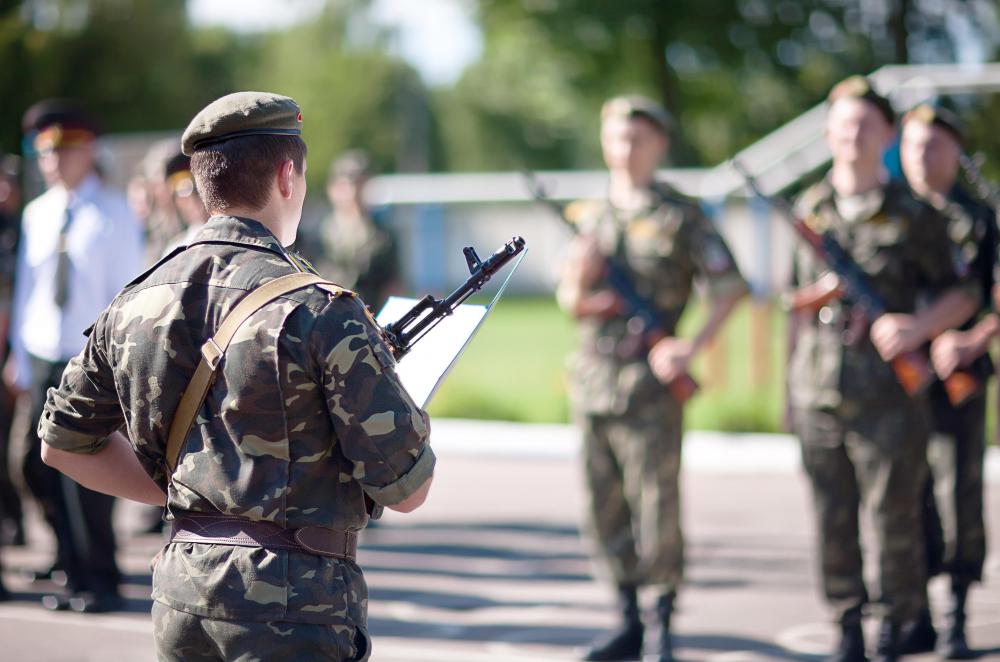At WiseGEEK, we're committed to delivering accurate, trustworthy information. Our expert-authored content is rigorously fact-checked and sourced from credible authorities. Discover how we uphold the highest standards in providing you with reliable knowledge.
How do I Become a Military Police Officer?
Military police officers serve a variety of functions in branches of the armed service around the globe. From guarding bases and securing prisoners to providing security both at home and abroad, military police officers provide essentially the same duties as civilian police officers, security personnel, and prison guards. While every country has specific rules regarding enlistment, steps to become a military police officer typically involve enlistment in the military, along with passing a series of tests and training, both academic and physical.
In the United States, all branches of the service have soldiers or civilians who fill military police-type roles, but some use titles other than military police officer. For example, the United States Navy uses the name shore patrol. Before they can begin a military career in the United States, enlistees must meet a set of criteria regarding US residency, age, education, and number of dependents. The requirements vary depending on which branch of the service a person is interested in entering.

Passing a Military Entrance Processing Station medical exam and the Armed Services Vocational Aptitude Battery (ASVAB) test are also usually required. These scores may also limit or expand the amount of jobs that are open to applicants, including those seeking to become a military police officer.
Meeting with an armed services recruiter is the best way to get the enlistment process started. A recruiter can ensure applicants meet the basic requirements and will explain career options for his particular branch of the service. A recruiter also will schedule any required tests and offer guidance throughout the enlistment application process. During this process, the applicant will be asked to select a Military Occupational Specialty (MOS). A MOS is similar to a job title in civilian life, and broadly defines what your day-to-day duties will entail in the military.

After completing the enlistment process, new recruits attend basic training where they are taught the skills required to be a soldier. Basic training typically ranges from eight to 12 weeks and covers a variety of topics, including confidence, endurance, marksmanship, and more. After graduation, the soldiers enter their advanced training.
The next step to become a military police officer is attending training specifically designed for that MOS. Military police officer training addresses physical, emotional, and academic areas. MPs often interact with people in stressful situations, so it's important that they possess the skills to control and diffuse volatile situations. MPs may also use weapons which they were not exposed to during basic training, so additional weapons training is often necessary.

After completing their advanced training, the new graduates are assigned to a military police unit where they officially begin their careers. MPs patrol military establishments in the United States and overseas, they guard prisoners in war time and peace time, and they protect military personnel and property around the globe. While the steps to become a military police officer require dedication, serving as a military police officer can provide a solid foundation for a future career in civilian law enforcement.
AS FEATURED ON:
AS FEATURED ON:















Discussion Comments
I have a cousin who retired from the army. He spent most of his service time as an MP. He said the biggest difference between an MP and a civilian office is that the MP is often going up against men and women who have been trained to defend themselves and trained to kill.
My son is doing a school project, and he has to choose several careers that he is interested in and then research the careers and make a presentation to his class telling how he would go about getting a position in his chosen careers. Thus far he has decided to become a doctor, and he wants to learn more about how to become a private investigator and how to become a police detective.
A short career in the military as a police officer would certainly come in handy for the last two careers he has chosen. I think a stint in the military and an honorable discharge from the military is an asset on any resume.
It's great how you can go into the military and find a career that you can then transition into if and when you leave or retire from the military.
If I had been aware of all the military had to offer in terms of training me for a future civilian career, I would have seriously considered signing up after high school. Instead, I went to a four year college because that's what all of my friends were doing, and that didn't work out so well for me.
I think most people would feel more comfortable with and have more confidence in a police officer who in addition to civilian police training had served as a military police officer.
Post your comments